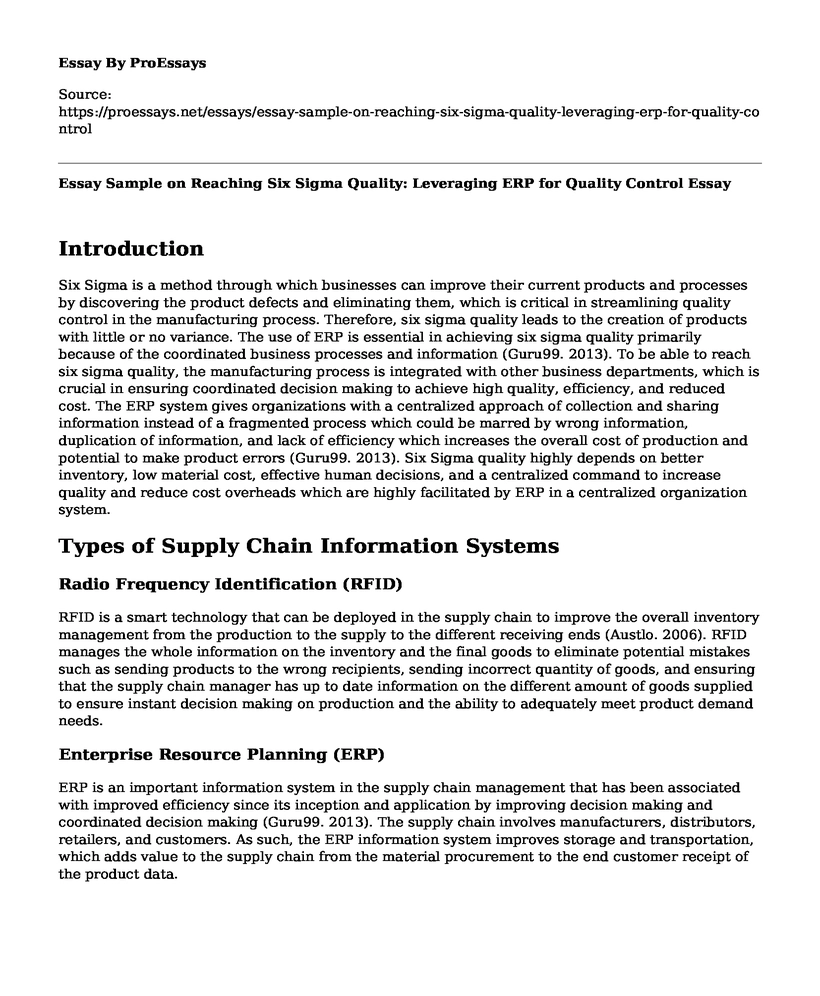Introduction
Six Sigma is a method through which businesses can improve their current products and processes by discovering the product defects and eliminating them, which is critical in streamlining quality control in the manufacturing process. Therefore, six sigma quality leads to the creation of products with little or no variance. The use of ERP is essential in achieving six sigma quality primarily because of the coordinated business processes and information (Guru99. 2013). To be able to reach six sigma quality, the manufacturing process is integrated with other business departments, which is crucial in ensuring coordinated decision making to achieve high quality, efficiency, and reduced cost. The ERP system gives organizations with a centralized approach of collection and sharing information instead of a fragmented process which could be marred by wrong information, duplication of information, and lack of efficiency which increases the overall cost of production and potential to make product errors (Guru99. 2013). Six Sigma quality highly depends on better inventory, low material cost, effective human decisions, and a centralized command to increase quality and reduce cost overheads which are highly facilitated by ERP in a centralized organization system.
Types of Supply Chain Information Systems
Radio Frequency Identification (RFID)
RFID is a smart technology that can be deployed in the supply chain to improve the overall inventory management from the production to the supply to the different receiving ends (Austlo. 2006). RFID manages the whole information on the inventory and the final goods to eliminate potential mistakes such as sending products to the wrong recipients, sending incorrect quantity of goods, and ensuring that the supply chain manager has up to date information on the different amount of goods supplied to ensure instant decision making on production and the ability to adequately meet product demand needs.
Enterprise Resource Planning (ERP)
ERP is an important information system in the supply chain management that has been associated with improved efficiency since its inception and application by improving decision making and coordinated decision making (Guru99. 2013). The supply chain involves manufacturers, distributors, retailers, and customers. As such, the ERP information system improves storage and transportation, which adds value to the supply chain from the material procurement to the end customer receipt of the product data.
Cloud Computing
Cloud solutions have revolutionalized supply chain management by scaling the overall operations. The cloud solutions increase accuracy and inventory optimization using the cloud-based supply chain management application that monitors and trace the product movement from the assembly point to distribution (Information Services Group (ISG). 2013). A cloud-based platform for information system ensures that there is a single source of information which is crucial in improving accuracy in the entire supply chain.
Important Trends in Information Technology That Would Impact Supply Chain Management in the Future
Digital Supply Chain
Information technology advancement has led to the adoption of a digital supply chain where all parties have easy access to information. There is real-time traffic data transfer, which affects the shipping of products and the end user confirmation of receiving information (Chopra, 2017). The internet of things capability has improved tracking of goods in transit whereas new information technology which has created the Smart Road technology has helped in the management of the supply routes based on traffic and weather information which makes it easy for the supply chain to plan new routes based on the available information avoiding delays of products on transit.
Artificial Intelligence and Advanced Analytics
The supply chain will experience significant improvement in the future through self-learning and natural language processing capabilities that will automate many supply chain processes such as demand forecasting and predictive maintenance (Chopra, 2017). The AI revolution will improve risk mitigation in the supply chain through advanced data analytics and continuous identification of patterns evolution in the supply chain. Therefore, organizations will be able to anticipate future scenarios and adopt a more proactive decision-making approach.
References
Austlo. (2006). RFID - Technology Video. YouTube. Retrieved from https://www.youtube.com/watch?v=4Zj7txoDxbE
Chopra, S., (2017). Supply chain management. Strategy, planning & operation. Seventh edition. Boston: Pearson Education, [2017].
Guru99. (2013). What is SAP? Why do we need ERP? Beginner Tutorial. YouTube. Retrieved from https://www.youtube.com/watch?v=lYCEQqSM08I
Information Services Group (ISG). (2013). Cloud Platforms: Opportunities and Risk Factors. YouTube. Retrieved from https://www.youtube.com/watch?v=ptw8cp8gv-o
Cite this page
Essay Sample on Reaching Six Sigma Quality: Leveraging ERP for Quality Control. (2023, Jan 18). Retrieved from https://proessays.net/essays/essay-sample-on-reaching-six-sigma-quality-leveraging-erp-for-quality-control
If you are the original author of this essay and no longer wish to have it published on the ProEssays website, please click below to request its removal:
- Competition and Bankruptcy of General Motors SWOT Analysis
- The Reasons Why Employees Join Unions Essay Example
- Essay Sample on Ethical Actions Within Organizations
- Understanding Purchaser Behaviour: The Essentials of Promotion
- Essay on Energy Consumption and Economic Growth in Brazil: A Decade of Increase
- Essay Sample on Walmart: Enhancing Performance With Supply Chain Technology
- Paper Example on City's First Response Agencies Under Pressure: Inferior Emergency Mgmt System







